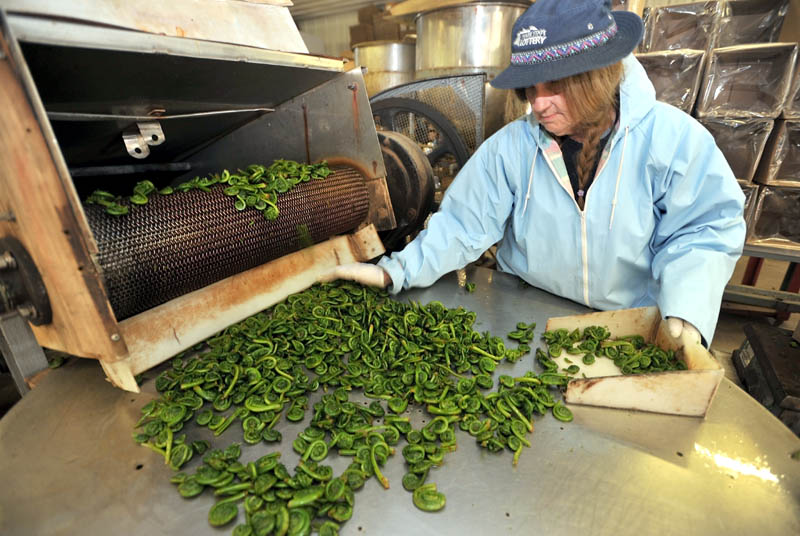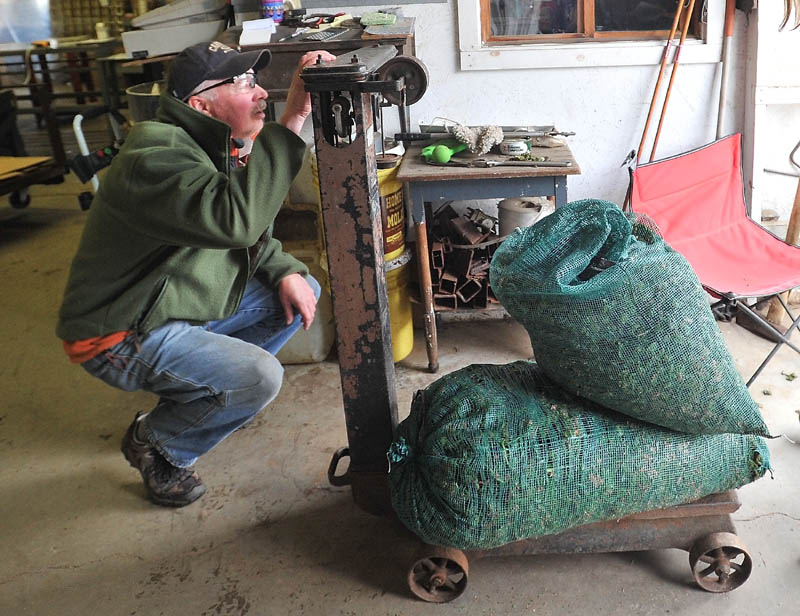WILTON — An army of fiddlehead pickers has spread across central Maine early each morning for the past few weeks. They scour streams and riverbanks and fill onion sacks with the tiny curlicue ferns, named for their resemblance to a fiddle’s head.
By the early afternoon, these foot soldiers start arriving in waves at a small building in Wilton, where Butch Wells awaits the daily bounty of the unique New England delicacy.
Wells pays the pickers and ships the fiddleheads to markets and restaurants across Maine and nationwide, re-creating an exchange that has played out for generations at W.S. Wells & Son.
But recent shifts in the specialty food market have caused a few changes at the family-owned business, which had been the last remaining small cannery operation in the region until about three years ago.
That’s when Wells shut the canning machines down in favor of selling only fresh fiddleheads, ending a tradition that his great-grandfather started more than 100 years ago.
Despite the change, however, the business continues to thrive and support an underground economy based on people selling fiddleheads to make some extra money each spring.
“There’s a lot more to the fiddlehead and canning business than people think,” Wells said.
New take on family tradition
Wells, whose given name is Adrian, same as his father, has a small office filled with keepsakes of his family’s business, each memento another chapter in a story that spans four generations and the small rural towns they called home.
Pictures of his great-grandfather and grandfather hang next to colorful canning labels bearing the family’s Belle of Maine brand name. The intricate label designs feature dates reaching back more than a century.
Papers and news clippings yellow from age spill out of drawers onto desktops. Filing cabinets overflow with years of records, cooking recipes and family secrets about cleaning and canning produce.
Wells even keeps a rust-covered can to remember his great-grandfather Walter Scott, who started the family business in North Anson in 1894.
He picked up the heirloom earlier this week, looked over the photos on his office walls and recalled the history behind the family business passed down from father to son over the years.
Following a brief stint when the cannery was in Dryden, his grandfather Vance Wells Sr. moved the business to a property off High Street in Wilton, where it remains today.
After settling in the rural Franklin County town, the small family-run cannery business was constantly evolving over the decades. They started out canning pie mix and sauce from apples picked from an orchard at the site, expanding into string beans, tomatoes and other produce grown on farms nearby.
Competition from big commercial cannery operations, however, eventually forced his grandfather to rethink the business. In 1967, he was approached by an Old Town man who was harvesting a crop that would go on to redefine W.S. Wells & Son.
That’s when Vance Wells Sr. began canning fiddleheads, the Northeast staple dating back to the 1700s. But it was a gamble because few people outside of the close-knit agriculture community really knew about the edible fern until the late 1960s, when Wells became one of the first people to commercialize it.
Fiddleheads, the early growth of the Ostrich fern, are cleaned, boiled and served in a variety of ways, ranging from sautés and salads to soups and casseroles. They combine the flavors of asparagus and mushrooms.
When the cannery in Wilton began selling fiddleheads to grocery stores nationwide, the business thrived by tapping into a growing demand for specialty foods. It eventually added canned dandelions and the operation peaked in the early 1990s, when the cannery processed about 69,000 pounds of fiddleheads alone.
Butch Wells and his father kept the canning operation running for the next couple decades, but about three years ago the son decided to shut the cannery machines down and focus solely on selling fresh fiddleheads.
More people had started to demand fresh fiddleheads instead of canned ones.
“Part of the reason we shifted to shipping fresh instead of canned was the cost to deal with the regulations,” he said.
The change to selling fresh fiddleheads saved the business, which over the past three years has shipped an annual average of about 25,000 pounds of fiddleheads to retailers nationwide, he said.
Instead of selling canned produce to grocery stores, they sell fresh fiddleheads directly to restaurants, co-operative markets and other smaller operations, Wells said. He added that the profit margins are also better because shipping costs are less expensive for the fresh fiddleheads, which weigh much less than canned ones in water.
Today, the business almost solely focuses on selling fresh fiddleheads during the spring picking season, which starts in mid- to late-April. Wells also sells dried beans to a natural food store, primarily to supplement operation costs on his family farm in Chesterville, where he lives. He said he has no plans to fire up the cannery operation again because the fresh fiddlehead market remains strong.
Wells keeps details of the business close, saying there are a lot of competitors who have tried for years to get the family secrets about everything from cleaning produce to fiddlehead harvesting.
‘Like finding a good fishing hole’
At one time, W.S. Wells & Son harvested fiddleheads on its own commercial farm, which was among the first of its kind where rows of the green Ostrich ferns were picked each spring.
Wells has a 1971 Yankee Magazine that featured an article on his grandfather. A photo accompanying the article shows him in the fiddlehead field along with other pickers.
But then the business changed, and they started exclusively buying fiddleheads from people who went out hunting for the ferns growing in the wild. The cannery in Wilton essentially became a marketplace for these people, who had been struggling to make extra money each spring by selling their fiddleheads alongside roads, Wells said.
He even continues to buy fiddleheads and work with many of the same people who sold to his father, Adrian Sr., who is now 76 and has Alzheimer’s disease.
Among those longtime pickers is Brian Marble, who recalls hunting for fiddleheads across Maine and New Hampshire 30 years ago. Marble, now 54, sat at the cannery loading dock this week and reeled off the dozens of streams and riverbanks he has picked over the years.
Nowadays, Marble mostly makes deliveries for Wells instead of picking. During the spring, he makes frequent drives in a van loaded with fiddleheads to Logan International Airport, where some of the crops depart from to reach buyers nationwide.
Marble and Wells will also give tips to the younger pickers, telling them about everything from the best weather conditions to picking techniques to bring in a good fiddlehead haul.
A steady stream of pickers showed up at the loading dock on Tuesday afternoon. Each time someone dropped off a sack full of fiddleheads, Marble and Wells launched into a tutorial.
They would warn, for instance, that picking a fiddlehead too early is pointless. Undersized fiddleheads are inedible and mildly poisonous, which is why Wells said he will pick out the bad ones before he weighs each onion sack.
Wells pays for fiddleheads based on a set price per pound, and one of his longtime pickers described earning between $1,500 and $2,000 in a good season. Another tip for a good haul involved watching out for heavy rains, because a little rain helps the growing season while too much will wash out the crops.
The fiddlehead growing season will start in the south and work its way north.
But the unseasonably warm temperatures and mild winter sped up the timetable this year, with picking across central Maine kicking off in mid-April instead of the more traditional May 1, Wells said.
Mike Allen, 28, of Wilton, arrived Tuesday with a half-full bag of fiddleheads. He said he is unemployed and hopes selling the ferns to Wells will help him stay afloat until he finds another construction job.
Allen remembers picking with his father as a child, but added that this week was his first time picking in a while.
He asked for advice about finding a good crop before heading back out on the hunt.
Wells responded with a few tips and added, “It’s like finding a good fishing hole, because you just have to know what to look for.”
David F. Robinson — 861-9287
drobinson@centralmaine.com
Send questions/comments to the editors.




Success. Please wait for the page to reload. If the page does not reload within 5 seconds, please refresh the page.
Enter your email and password to access comments.
Hi, to comment on stories you must . This profile is in addition to your subscription and website login.
Already have a commenting profile? .
Invalid username/password.
Please check your email to confirm and complete your registration.
Only subscribers are eligible to post comments. Please subscribe or login first for digital access. Here’s why.
Use the form below to reset your password. When you've submitted your account email, we will send an email with a reset code.